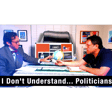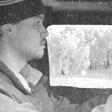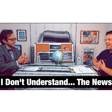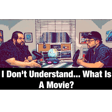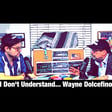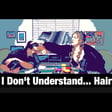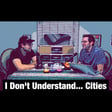Become a Creator today!Start creating today - Share your story with the world!
Start for free
00:00:00
00:00:01

I Don't Understand... How To Make A Comic Book
How do you make a comic book? I asked Milton Lawson, author of the incredible science fiction comic book - "ORSON WELLES: WARRIOR OF THE WORLDS." Did I learn? We'll see! Enjoy the trip.
For more from MILTON LAWSON visit:
OrsonWellesComic.com
Recommended
Transcript
DC vs. Marvel: A Humorous Debate
00:00:00
Speaker
DC or Marvel?
00:00:03
Speaker
Do i answer this just without you qualifying it or can i ask you to qualify Let me qualify it. DC, Dane Cook or Marvel, my friend Jerry Marvel. I'll go Jerry Marvel. I don't know who Jerry Marvel is.
Show Introduction: I Don't Understand
00:00:17
Speaker
Last night I journeyed backwards in time to the medieval world of Dark Tower. Where's my snare? I don't understand what's going on. Welcome to the show. Welcome to I Don't Understand. It has a completeness to it. When I'm finished with a story, whether it's a spirit story or a book or a graphic novel, there's a completeness to it.
00:00:37
Speaker
that that satisfies me.
Comic Fandom Journey
00:00:39
Speaker
Superman died Wednesday. Were you pissed when they killed Superman? I feel like a lot of comic fans have a similar journey where they take breaks from comics and then come back. I sort of observed the the phenomenon from ah from a distance and then when I came back to it, I could appreciate the storytelling of it. I'm with the acclaimed writer.
Guest Introduction: Milton Lawson
00:01:00
Speaker
would you like to be credited? Acclaimed?
00:01:01
Speaker
My guest today is Milton Lawson. Milton, breaking the law, breaking the Lawson. Who sings that? Daniel, who sings that song? Priest, right? Oh, I should've... No, you talk, you talk. No, please help me, save me. This is not one of those shows where you have to wait to talk.
00:01:19
Speaker
help the whole Talk the whole time. The author, Milton Lawson, author of Orson Welles, Warrior of the Worlds. Warrior of the Worlds.
Milton Lawson's Sci-Fi Epic
00:01:28
Speaker
It is a fun sci-fi, epic, globe-trotting, time-hopping, biological, terraforming terror.
00:01:35
Speaker
I wish we could do a second printing so we could put that on on the back of the book. It's like 15 Enders games, 25 Starship Troopers, and Henry V, and that's all in the first 20 pages. He shoots movies during the day, shoots aliens at night.
00:01:48
Speaker
That rules. That's awesome. Thank you for coming up with that. That's awesome. That didn't exist. Milton made that up. He came up with that, and now i have that in my head. And I love that. I love thinking about that.
00:02:01
Speaker
You are a writer, sir. Damned interesting work, I'd imagine. Yes. Damned difficult, I'd imagine. Where do you come up with all this stuff? How goes the life of the mind? Well...
00:02:14
Speaker
Influences. Let's start by looking at the city of the future. i went with some of the hard sci-fi guys like Arthur C. Clarke. Visualizing the future as it really will happen. I was big time into astronomy and physics.
00:02:27
Speaker
A world in which we can be in instant contact with each other wherever we may be. Why was that good idea? When did you start making comics?
Favorite Comics and Cyberpunk Influence
00:02:34
Speaker
About 14 or 15 years ago. What are your favorite comics? Transmetropolitan.
00:02:41
Speaker
I loved the cyber punks. The Nobel Prize for literature is overdue for the cyber punks. They prophesied the world we're living in now. Everything we live in right now feels like it's from a cyber punk novel. Do they predict that or do the people in the world just go like, we're creating the future based on that? shit we read in the 80s, because we can't think of anything else. You know, it's a little bit of both, I guess, because Zuckerberg wanted to, you know, name the metaverse off of the Neil Stevenson book.
Nerd Culture's Rise to Prominence
00:03:11
Speaker
Let's do a shitty version of this.
00:03:13
Speaker
See, this is when nerd culture, you know, I'm way into all of this, but nerd culture can go very terribly awry.
00:03:24
Speaker
10 years ago, nerd culture took over. Somewhere around 2011 or 2012, I feel like nerd culture really was at the forefront. We call it the nerd flu at G4. You had guys like Joss Whedon, Chris Hardwick, and Neil Gaiman. Remember these names?
00:03:39
Speaker
America wants to see these legs.
00:03:45
Speaker
I remember the names. Before there were arrests and executions. Before we publicly arrested and executed Joss Whedon at The Hague. I can't tell. What's going on with this? Is that his shirt or is that just his orange body? I'm Chris Hardwick. Let's throw it to someone else who's got to do another thing. It's cool to be a nerd. Like, we are Hague.
00:04:02
Speaker
Joss Whedon's going to get to make the biggest movie all time. Chris Hardwick's going get host the biggest, ah every show in the world and talk about nerd stuff. No Game of Gets to make every insane thought he has into a brilliant book. Now here it's 10 years later.
00:04:14
Speaker
And they are all pieces of shit. Apparently so. According to all the accusations, I worry about guys like, I mean obviously, you know things like this happen where people are given this power and they do horrible things with it.
00:04:26
Speaker
And i it's something it sucked that it had been.
00:04:33
Speaker
So listen to me, you dignified get. Just who the hell do you think you are?
Alan Moore’s Swamp Thing
00:04:38
Speaker
Alan Moore doing Swamp Thing. Love it. Is that one of the best things ever, or or am I a basic bitch for that? No, it is one of the best things ever. And it's not only one of the best things ever.
00:04:48
Speaker
It's one of those things that every time I return to it and some of my friends return to it, it's one of those things as a writer you look at and you'd be like, what am I even doing? I'm never even going to touch this. Why are we even, we're just playing in this dude's world.
00:05:01
Speaker
That is so accurate. And as a as a writer, it feels a little annoying. Do you get ah annoyed at Alan Moore? You're like, oh, come on, man. Why are you good at this? I try to like shift it into inspiration. And a lot of times I can... because Alan Moore is such just like, when he did Swamp Thing, that was um fucking awesome.
00:05:19
Speaker
Brilliant. You put these people on a pedestal and you're like, that's just totally unachievable. But you know, ah yes, Alan Moore is a great writer, but he also wears all those rings. All of the streets had names like Moat Place or Port Street or Dungeon Alley or whatever.
00:05:35
Speaker
The two-parter that ended the original Superman canon, they got Alan Moore to write what would be the end of original that whatever happened to the man of tomorrow? Whatever happened to the man of tomorrow. And then two issues, and in two issues, he wrapped up the entire Superman mythology in such a satisfying and perfect way.
00:06:00
Speaker
It's just one of those just staggering works of accomplishment. television, movies, comics, rock and roll records. That is the main way that kids sort
Appreciating Dune
00:06:09
Speaker
soak up all this info. Frank Herbert? Dune? Dune or Dune Not?
00:06:13
Speaker
i I wouldn't count him as an influence because i I didn't read Dune until very late in life, but I did admire it. Dune Not. I like Isaac Asimov. i like him because his name sounds like he's a robot.
00:06:25
Speaker
He sounds like he's a robot. Isaac Asimov. Fuck. I am the Isaac Model 3000 and I live to serve.
00:06:37
Speaker
Slave.
Isaac Asimov's Name: A Humorous Take
00:06:40
Speaker
Robot is short for Robotnik, which is Swedish for slave. He sounds like he's a robot. Isaac has a bomb.
00:06:49
Speaker
Fuck. I enjoy it. You know, why not? Aldis Huxley. Aldis Huxley. Aldis Huxley. Okay, Aldis Huxley. I would say like in the long view of my biography, I would i would be much more of a sci-fi person because, um you know, I saw the original Star Wars in the theater at age six or so.
00:07:15
Speaker
Blew me away. was amazing. Is it good? i haven't seen it. Is that good? What's that one about? Let's look up the Rotten Tomatoes score. Let's see where it's at. Yeah. yeah Is it good on IMDb? Yeah. What's it? Who directed it?
00:07:28
Speaker
don't know. And then... And then... The THX guy? Yes. Oh, no. Right. THX. I'm not a fan. Stay out of things you don't understand, right? In addition to getting me interested in science fiction, back before the internet, back before DVD extras, they would put specials on PBS showing some of the making of special effects features. We didn't even have access to what then was a normal echo chamber.
00:07:56
Speaker
God only knows what a guy with these ears considers to be a normal sized echo chamber. But they didn't have one. And God bless this man. And God forgive me.
00:08:10
Speaker
God real?
Magic of Filmmaking
00:08:11
Speaker
And you had never seen anything like that before. And it just blew my mind because as a kid, you go in and you watch this thing and it's like, this is this world. It just exists.
00:08:22
Speaker
It's a thing. And then you start to learn that, oh, wait a minute, there are people that make this thing. And so I watched those documentaries and everything. So i I became very interested in, you know,
00:08:36
Speaker
the process of making movies. How hard is writing? Writing is hard. Isn't writing hard? Well, yeah, all writing is hard for sure. From Shakespeare to now. In the earliest days, I was just all on my own
Joining a Writing Workshop
00:08:47
Speaker
and I started writing scripts and they were terrible.
00:08:52
Speaker
And i ah they had good ideas and intention behind them. but they were overstuffed. They weren't properly targeted for the comics medium. Like I would make rookie mistakes. Like I would write a description of a panel and there would be multiple actions going on, but one panel was like one freeze frame in time.
00:09:12
Speaker
So you really can't even do that. So after a couple of years of struggling that way, i joined a writing workshop called the Comics Experience Workshop. Was this like a, this was like a group? Yeah.
00:09:24
Speaker
Like a, of writers. Yes, writers and artists, but mostly writers. This sounds like communism. This is what they were worried about. Tell me about this group of writers.
00:09:36
Speaker
Go on. I work for the committee here. They know how we go about handling situations of communist infiltration. I learned a lot from that process.
00:09:46
Speaker
Yeah, whatever. I wonder if Milton could tell I'm Jack and McCarthy off under the table. Yeah, I like it. We're all secretly gay. Don't tell anyone. These fucking guys talking about who's going to American, I'm going to tell you this.
00:10:00
Speaker
Anyone who wants to be a fucking American could be a fucking American. How do you come up with these like sci-fi words? You are a sci-fi writer. You have to come up with these sci-fi words and some of them I can't pronounce.
00:10:10
Speaker
How do you come up with them? You know, that's my fault. and so Some of them probably can't even No, hold on, hold on. What is the name of the otter detective? I want you to say The otter detective? The detective who's an otter. Yeah. i was in Cranston Guildenstein. No, no. What are their real names? Oh, oh his real name. There's no way I can say that. okay, I wonder. I intentionally made it unpronounceable.
00:10:32
Speaker
See, this is what happens. a lot of times when I'm reading sci-fi books, I'll be like, this is um the hardest word ever. I don't know if I can read this word. And I always wonder, do these sci-fi writers, when they're coming up with these words, they go like, Sam's gonna be pissed when he has to read this one.
00:10:44
Speaker
Or do they, or in your head, or are you like, no, Gaborvich in Georgian is a very normal name and you should be able to read it. So that was a bit. You were doing a bit on me on that one. little bit, little bit, little bit of a bit. this was ah The name is like 500 letters long.
00:10:58
Speaker
You had a problem with me, man? I'm real interested in helping you sort it. and What came first? I want to make a sci-fi globetrotting epic or I want to make a Norris and Wells book? I usually remember like the two synthesis points for almost all of my other comics, but for this one, it was just sort of inevitable because I'm such a sci-fi fan, I'm such an Orson Welles fan, it just sort of appeared.
Collaboration in Comic Creation
00:11:22
Speaker
How collaborative collaborative is it with the artist? Like when you say like the moon of Zorobdor and like the the ten rings blah blah blah, not blah blah, that's really disrespectful. You have actually interesting things you say. No, no,
00:11:36
Speaker
No, I don't want to do In the first draft it might actually be there. I you know, but look, look at these splash pages. is this what that's called? A splash page? Yes, yes. Look how beautiful this is.
00:11:51
Speaker
This guy, so, but does your artist go like, oh god, and so you make him at do some pretty impossible things, he's pretty brilliant here. Yeah, I was extremely fortunate to work with Eric. So the artist Eric Whalen, Whalen Yutani, sci-fi, you choose each page, like this is gonna be how many panels? When does the panel when is the panels come into your head, and this page is six panels, this page is one big panel, how does that process happen for a comic book writer?
00:12:17
Speaker
The more i experience you get, the more you get a feel for like how much you can fit in ah given unit, like an issue, like an arc, like a page, like a panel.
00:12:29
Speaker
I'll bullet point out all the stuff I want to happen, and then I'll write down like, okay, these these three bullet points I can do in like one page, this one's going to take three pages, this feels like it needs to be four panels, panel one. yeah Guy does the thing, panel 2, guy says the F word.
00:12:49
Speaker
And it's it's just the minimal amount of detail I need yeah so that I know the next time I come back to this and then I actually really write the final version or multiple drafts of it, that's the first kernel of it.
00:13:03
Speaker
Does the artist ever say something like, hey, I could actually knock this out in one, like in three panels if I actually, is that a part of it? Usually it tends to work better when they actually want to add a panel versus want to subtract one. But usually if they want to clarify something or add another beat or focus on something, yeah um that tends to work even better. That's why I'm not an artist, because I would be like the laziest artist. I'd be like, can we just do this in one panel? Just one big panel, his face, just a close-up of his stick figure face.
00:13:34
Speaker
What does this guy say? mean, the eyes tell you enough. I'm telling you they tell you enough. I want to talk about that process from it being a thought in your head to it being something I'm holding in my hand.
00:13:46
Speaker
Take me through that journey because that's something that is pretty cool. What you doing over there? You guys are doing a Mystery Science Theater of this show?
00:13:57
Speaker
Like, this guy sucks at interviewing. Invalid. Tonight, on the season finale of Men in Glasses Wearing Hats. so how does I don't like it.
00:14:08
Speaker
What's going on over You know what I don't understand? Why anyone would want to watch this show? It stinks, it stinks, it stinks.
00:14:19
Speaker
One of the things you have to look out for, you've got multiple characters in a panel and there's some dialogue back and forth, you need to make sure that the left to right positioning of the characters ah is done so that the person who speaks first is on the left and the person who speaks second is on the right.
00:14:38
Speaker
And sometimes that that fundamentally obvious thing still gets lost few times. And I'm the guy you're worrying about because I'm the guy who's like, oh wait,
Praise for Lawson's Book
00:14:49
Speaker
where did that bubble go? Like, I have to make sure, oh, she says this before this. and I am the guy you need to worry about.
00:14:56
Speaker
I'm like, wait, does this panel go here or here? but your book was very easy to follow. A dumb man reviews a book. This was very easy to follow. um No, it's very beautiful and it's very inviting. It's very engaging. Remember in this like black and white art deco world of Orson Welles?
00:15:13
Speaker
I love that art deco world. They're like 1940s, 1930s, black and white. That's very cozy to me for some reason. why You know, I grew up kind of viewing, as a kid, viewing black and white as like just artifacts from an older era. Devil on the canvas, 12 Apple, take one.
00:15:34
Speaker
And then when I got older, i began to see a few classics. And then you experience something like the Maltese Falcon. And you go, oh my God.
00:15:46
Speaker
Miles had many brains, but he'd had too many years' experience since a detective would be caught like that by a man who was shadowing up a blind alley with his gun, in his hip and his overcoat buttoned. and Orson Welles was saying, and to me the other day he was saying that um there is no true great performance in color.
00:16:01
Speaker
Performances on film can only be great in black and white because black and white has less distractions. There is a purity with black and white that you are so focused on the performance of the face of the actor that you're not focused on anything else. So that he says the greatest performances can only be in black and white. But he had strong and hard opinions about a lot of insane things. Right.
00:16:19
Speaker
So maybe he's not right. There's a lot of good... i don't what he's talking about. Orson Welles was awesome because he would just say things. Was one of the early ideas what if that War of the Worlds broadcast was
What if War of the Worlds Was Real?
00:16:29
Speaker
real? Is that like how this idea starts? Yeah.
00:16:31
Speaker
The Columbia Broadcasting System and its affiliated stations present Orson Welles and the Mercury Theater on the air in The War of the Worlds by H.G. Welles. Mercury Theater, Orson Welles.
00:16:43
Speaker
He was a radio man in New York. I used to really judge those fools who got scared of the War of the Worlds broadcast. um Harshly, I thought they were lunatics. This guy is just picking his nose.
00:16:58
Speaker
That is a unfortunate. He probably understand that this would be forever. He's picking his nose forever. i mean, it's gross. I don't want to look at this. But now i kind of put myself back in their position, in their shoes.
00:17:11
Speaker
What's this guy doing? What's he reaching 80-year-old Austin Butler. And then the face reveal, and it's a face you've never seen before. It's a face that only existed in the 30s. Like, his mouth doesn't, mouths don't go that way anymore.
00:17:24
Speaker
Ladies and gentlemen, the director of the Mercury Theater and star of these broadcasts, Orson Welles. And you're just here, you turn on a radio broad, you turn on the news, the radio, And there's a guy being like, there's ah Kind of like a Fourth of July rocket. Yes, then what?
00:17:38
Speaker
I turned my head out the window and would have sworn I was to sleep and dreaming. Yes. And it's the 30s and we don't have the internet. You gotta remember, they didn't have the internet. The metal casing is definitely extraterrestrial.
00:17:50
Speaker
Not found on this earth. You think they might have had the internet. They could have been like, they didn't. Yeah. They don't have the internet for years. um So these people are just stuck in their car with this information.
00:18:01
Speaker
yeah I don't blame them for being going crazy. And I tell you what, I think we're going to experience something very similar to it with the with the rise of AI.
Modern AI Mistrust and Past Media Reactions
00:18:10
Speaker
but Parents have already been falling for this. So yes, perhaps it's that also. Like Orson Welles was also this brilliant guy.
00:18:17
Speaker
What was that thing where he was just like trying to apologize and they were all out? That radio show or that interview and he was trying to apologize. yeah What was going on there? They were all like... He said he was terribly shocked and terribly saddened or something like that. I'm of course surprised that the H.G. Wells classic... Very contrite....had such an immediate and profound effect upon radio listeners.
00:18:40
Speaker
And very heartfelt and he is of course fully and totally lying where he's pretending to be shocked Or well now I think there is a hint of reality in his experience because he i think he is feeling for his career to a certain degree so heat there's There's a certain amount of nervousness in that moment that's not Wellesian at all and authentic, but I think the text yeah of what he's saying is all bullshit. In some biographies, there are stories that like once he left that, I think it was in a hotel or something, and got in a cab with one of his colleagues, he immediately started laughing his ass off.
00:19:18
Speaker
I believe that 1,000%. I believe that Orson Welles, after he left that press conference, was like... You remember that scene in Wolf of Wall Street after he's like, okay, sir, gotcha. And he hangs up and goes, fucking idiot. Oh, fucking idiot. I believe that Orson Welles, after he left that press conference, was like, take it easy, Kev.
00:19:35
Speaker
Hey, thanks, Jordan. Thanks lot.
00:19:44
Speaker
He had an unprecedented set of control, amount of control on a very major motion picture from a major studio that you know had never been done before. They call him, or some people call him, Martin Scorsese told me, Martin Scorsese called him the truest auteur in cinema, or at least in American cinema, the truest of the auteurs. Do you agree with that?
00:20:05
Speaker
I guess at the time that was certainly the case. You sound like you have a more true auteur than Orson. Maybe Chaplin Chaplin. There we go. You know, you could make the argument for Chaplin. Because he was also like a studio owner for some of his, well... A suit?
00:20:20
Speaker
So, yeah. In that little suit? He was a little executive with a little mustache. You're all fired. Meet my girlfriend Lolita. It's built in. you want sharp pictures, this It's got to be a camera. I grew up knowing him as like a guy that was always on talk shows. And Mr. Churchill rose from his chain and bowed.
00:20:43
Speaker
and did those wine commercials. We will sell no wine before it's time. That's what I grew up knowing him as. What follows is a terrifying journey into the world of magic, mystery.
00:20:54
Speaker
Mr. Wells, this is a video will. I had no idea that he was an actor. Ten years. He must be tenacious of life. That was one of the things that actually got him noticed in theater at the early ages because he had this cherubic child look face and then this you know, miraculous, deep, resonant voice would come out and it would it would strike people.
00:21:20
Speaker
And Zac Efron worked for him. Yeah, Zac worked for him. And he fell in love with Claire Danes during that movie. There's that movie. Mia Norris and Wells. Edited by Sandra Adair. Sandra Darin, it's all of Richard Linklater's movies. Okay, she she's nice. I like the show.
00:21:34
Speaker
And he was using his income from radio to help stage some of these different plays because he he couldn't necessarily always give funding all the time. And some of the things he wanted to do were pretty radical and transformational.
00:21:47
Speaker
And in addition to everything else that the guy did, You know, he did this crazy prank on the radio that freaked everyone out. He arguably made the greatest film ever made. And he arguably did the greatest stage production in American theater history. His his stage adaptation of Julius Caesar was done where all of the characters were, and the set design was evoking Nazi Germany.
00:22:14
Speaker
And this was before America's involvement in the war. and the people who attended the play kind of review it as as just this sort of mesmerizing, lifting, terrifying experience.
00:22:30
Speaker
And, you know, if if we ever get that time travel stuff invented, that'll be one of my first stops. I would love to go see. Have you worked on that? Yeah, I'm i'm trying. You seem like you have some inside knowledge about some of this. I dropped out of physics. Favorite Orson
Impact of Citizen Kane
00:22:43
Speaker
Welles movie?
00:22:43
Speaker
You know, Citizen Kane changed my life. It's such a rewatchable film. You know, there's a reason why it topped the sight and sound poll decade after decade. It takes you on a journey and there are so many details packed into every aspect of the frame.
00:23:01
Speaker
You can just look around the edges and even look away from where your main area of focus and there's going to be interesting things to see. I appreciate that so much when the director puts that much... He put a lot... of He must have worked really hard on that movie.
00:23:15
Speaker
I guess Orson Welles worked hard on Citizen Kane. He just gets swept up and it's fun, it's escapist, it's funny. News on the march!
00:23:26
Speaker
When I watched that opening, I could sense like the Coen brothers, I could sense Kubrick, I could sense Paul Tom... I sense all my favorite filmmakers also watching that scene and being like, I don't want to be like that.
00:23:38
Speaker
What were Cain's last words? I mean, you could sense that. You could sense there's scenes like the Hudsucker Proxy that are almost identical to like that scene in the newsroom at Citizen Cain. And that's cool.
00:23:50
Speaker
That's awesome. I like that. No public man whom Cain himself did not support or denounce often support in out No, that movie came out in 1941. was doing Hitler bits.
00:24:07
Speaker
When Hitler but he was talking about... It was another room. Hitler could have been watching that shit. yeah it's It's almost like, Orson, stop filming and go kill Hitler. or some yeah why Why do so many time travelers have to go back and kill Hitler? If Orson was there, he could have done it.
00:24:20
Speaker
But he didn't. I just thought I was going to go see another movie with a great reputation and, you know, just have this, you know, one more data point and this ongoing thing. And what happened instead was i walked into the theater one person and I walked out of it a completely different person.
00:24:37
Speaker
I was changed. I was transformed. I was inspired to create things. And you say, what is it about Orson Welles? For me in that one film, one thing that's readily apparent in that film is there is one vision leading you. It's grabbing you by the collar. and It's like, this is what I want you to see.
00:24:59
Speaker
i want to you to go on this very specific experience. And I'm in control of everything that you see and hear. And I was transfixed. And then ah immediately had to find out more about this guy.
00:25:12
Speaker
your own immortality. do you have any feelings on that? No. And the last we see of you. These things would happen where Orson would leave and the studios would just mess with his movies they're like, we don't like this guy. Yeah. He was a pain in their ass.
00:25:25
Speaker
They should have given him, Hollywood should have let him do what he wanted to do. Why wouldn't they? There's a certain amount of jealousy in it. And the jealousy was on the contractual terms that he was given to make his first film.
00:25:35
Speaker
You know, he had never made a film before and he gets the best contract in the history of Hollywood. How's it going to make everybody out there feel?
00:25:44
Speaker
Then, once he makes the film, he puts the entire studio system at risk. The Hearst publishing empire tried to have the film destroyed, threatened the entire studio head, got all the studio heads together. Isn't that more embarrassing for William Randolph Hearst? Isn't that him admitting that this movie is about him? Shouldn't he be like, oh, that sounds like a cool movie.
00:26:10
Speaker
Don't know who that's about. Instead he's like, this is me. That's my house. That's my drunk wife. This guy's talking about my drunk wife at the opera singer or whatever. yeah i mean, he, I, you know what? I would probably not associate him. I would have not really associated him with Citizen Kane as much as I do, me in 2025. Yeah, yeah. But now I do because of his big stink he put up about it. Now I know for a fact that was you.
00:26:32
Speaker
What's more annoying, if they make a movie about you that's the best movie of all time or the worst movie all time? Oh, good question. If it's a takedown of Milton. It's a life and yeah where you're like, well, at least it's the best. Or like, I guess you want it to be terrible, so everybody watches it.
00:26:45
Speaker
Yeah, I guess me personally, I guess I would probably. You don't want generations of filmmakers to be like, it's such a great scene where this piece of shit gets killed or something. Yeah, so you probably don't want that to be a reputation. So I guess he's his his anger was a little justified in that, maybe. But he was probably a bad guy.
00:27:00
Speaker
I thought of something interesting. He made weed illegal with his propaganda. Piece of shit. Yeah, it's the Citizen Kane of Citizen Kane's. Actually, i like e for Fake more. Yes, his world is a world of make-believe.
00:27:15
Speaker
F for fake is the Citizen Kane of Orson Welles movies. According to informed sources, high officials in the Hughes Empire are not even now fully satisfied that the mystery is completely unraveled.
00:27:25
Speaker
And that that's a very solid argument. That one's extraordinarily entertaining. The super secretive celebrity who went all out for world fame, won it, and then got to be more famous trying for privacy.
00:27:43
Speaker
Maybe he's a loser, after all. Well, mean, that's a little harsh. A lady from his past once told me that's part of his charm. A lady from Howard Hughes' past once told you that part of his charm is that he's actually a loser.
00:27:57
Speaker
Is he winning now? At the end of this story. Oh, i mean, I don't know. Our semi-mythological nightbird of a billionaire has flown his Vegas coupe but only to go on mutely roosting on the top of various other holiday hotels in germ-free, air-conditioned solitude.
00:28:23
Speaker
BRUTAL. Where he can be strident in two different directions and and you never know if he's fucking with you or being on the nose. so if Kane, Citizen Kane, is number one by because it is, what is number two?
00:28:38
Speaker
I go back and forth on a lot of them, but I kind of go Chimes at Midnight. Oh wow. I'll play Gardaude College. because it is the culmination of his lifelong love of Shakespeare.
00:28:50
Speaker
And he actually started working on this concept of taking bits and pieces of historical Shakespearean plays and re-editing them into a new piece.
00:29:02
Speaker
As a teenager, once he got to the point to where he could he could play Falstaff, that's what he chose to do. is that why he gained all that weight? Yeah, that's why he did.
00:29:13
Speaker
He kind of became Falstaffian. Weight is such a journey. That's one of the things about Orson. I just call him Orson now. um He was, I liked that he he would just go on like the talk shows in the 70s and do magic tricks. Oh yeah.
00:29:27
Speaker
Have you read this book, ah My Lunches with Orson? Henry Jacklin, he also, what was he doing? He was recording these lunches with Orson Welles and just, but not secretly I hope. Yeah. That's interesting to note that Orson Welles is mean to every single person who comes by that table.
00:29:41
Speaker
Everybody who comes by the table to greet him and they all greet him, the great, like he's there and people go like, oh my God, like Cary Grant or somebody will come up and be like, huge fan. And like, thanks. And then they'll leave and they'll be like, what a fucking piece of shit that guy is. And then Henry Jacklin was like, oh, Orson, you can't say that. Is Jacklin British?
00:29:57
Speaker
He's like, oh, I just imagine him. Orson, you can't say that. He's probably British. Maybe he's not. Orson has made a very strong opinion, hard opinion. and he And he's certain about them. He knows he's right. And then like five minutes later, he'll say the exact opposite with the exact same amount of authority. But anyway, Orson Welles would be mean about every single person who would come by the table. Elizabeth Taylor and like Richard Grant. Richard Grant?
00:30:17
Speaker
come by the table and he just talks absolute shit about them when they're still in like ear distance. they They walk away and he goes like, I fucking hate them. These pieces of dog shit.
00:30:28
Speaker
They suck. And Henry's like, they are still right there. But Orson didn't care. He was a man who had, ah he was a brilliant guy. He's a really smart guy. But maybe they got in the way of some of his interpersonal reactions interactions with ah this other celebrities at that restaurant.
00:30:45
Speaker
He wanted to um murder John Landis. Do you think he had predicted Max Landis? Apparently. Apparently. Do you think he saw a vision of Max Landis said, you know, John Landis cannot... You could put his little goofy ass right there on the Mount Rushmore.
00:31:00
Speaker
Guys who had a little bit too much fun at the 2012 Comic-Con. What's going on? You see, my son, here time turns into space. The whole landscape becomes indistinct.
00:31:14
Speaker
Favorite sci-fi movie, real quick. Oh gosh, Empire Strikes Back. i mean Other than Star Wars. Outside of Star Wars. Ooh, now
Favorite Sci-Fi Films
00:31:22
Speaker
this is a good question. yeah But see, then i'll I'll be cliche again, I'll have to go 2001.
00:31:26
Speaker
And 2001 really goes to a lot of the things you were just talking about. That's i one of my favorite movies of all time because it does what I need. It tries to answer the things that are unanswerable, but at least it tries.
00:31:40
Speaker
you know but i mean, just try.
00:31:44
Speaker
A forest ebbs out and a wall of rough rock ebbs in, through which can be seen a gateway. The two men pass through the gateway. What happened to the forest?
00:31:57
Speaker
you You know, I'm sitting around going, what the hell's going on here? Why is outer What is outer space? What is that shit? The moon. It's the moon. I mean, I get annoyed looking at outer space sometimes. So I appreciate sci-fi writers who try to explain this thing to me.
00:32:10
Speaker
The two men did not really move. They did not go anywhere. And yet, they are not now where they originally were. Because I don't really accept... I need to learn a little bit more about what this planet And I need to learn a little bit more about why I'm alive.
00:32:24
Speaker
I'm not exactly satisfied with the no information. They go, it was God. And I go, okay, i need a little bit more. And they go, we don't have any more. You know, I mean, it's a little frustrating. Here, time turns into space. The murky history of the CIA from the end of the Second World War to the present day We all have grown up as a you know as a species and as as society with a certain set of understandings of the world that conform to certain patterns.
00:32:54
Speaker
There are a lot of religions in which there's a God figure in which you know we are created by this God figure. and You know, we're in service of some sort of a plane of existence or something, and there may be ah another plane that we ascend to after death.
00:33:14
Speaker
And that sort of framework has permeated culture, and it's the dominant storytelling, fundamental underlying premise of every story, or most every story, for the history of storytelling. And now we we're finally getting stories that grapple on a philosophical and emotional level, like Well, wait a minute.
00:33:35
Speaker
If there were infinite me's, if there's infinite you's, what is the point of this version of me? And what horrible things are happening to other versions of me at this exact moment? If everything's happening to me right now, then there's a lot of bad things that could be happening to a person.
00:33:50
Speaker
worried but I'm worried about those me's. No, I gotta worry about those me's? There's a version of me right that's getting the shit beaten out of them. By you! Of course. Why are you doing it? The math says... I know, I know I'm getting a little pissed off, though. There's an equal number of me's getting beaten to shit up by you, though. i I refuse to believe a Sam on any universe would ever harm... Can you please, as a comic book author, explain the multiverse to me?
00:34:19
Speaker
i don't understand it at all. and From a narrative point of view or a physics point of view? Both. Okay, so is it a place you could go to or is it... Like, there's infinite me.
00:34:31
Speaker
There's infinite everything. Yes. Where? So basically it's it's it's in a chalkboard on some physics professors' set of equations, and we don't understand quantum physics.
00:34:44
Speaker
And so I think it's called the Everett interpretation, that the way that they make the math work out is that you know every possible event It can simultaneously occur in multiple ways, so therefore every possible interaction of every particle that's ever happened can split into every imaginable combination. This is that thing where you put an apple in a box and you leave it in the box for eternity and it turns into everything that's ever been made.
00:35:20
Speaker
Schrodinger's apple, there we go. i don't know if I believe that. I don't think the apple would be like, and now I'm Homer Simpson. um The apple knows to turn into Homer in all the different versions of Homer. I don't think it would turn See, I don't think, i don't think an infinity knows it could do that.
00:35:34
Speaker
I love Philip K. Dick. Are you a guy... Oh, I love Philip K. Dick. I should have included him in the list. He, to me, is one of my faves just because there is this neuroses that goes through it this, like, comedic, neurotic kind of nature about society. Sort of similar, like, talking to Orson Welles, like, Kafka, The Trial, where, like, things are just constantly ah up against you and that all of a society is sort of, like, being an asshole to you specifically. like um Milton, where are you from?
00:36:03
Speaker
You know what? It's a very simple question, but I have a hard time answering it because I've lived in every state below the Mason-Dixon line. Where is that? What is the Mason-Dixon line? um It's something I learned in school and can't really remember. What was the best place you lived?
00:36:17
Speaker
Ooh, the best place I'd love you, Brad. Probably Houston, Texas. Hell yeah. Home of the 2017 champs, the Houston Astros. 2017, we still rep it.
00:36:30
Speaker
Does that one count? The garbage counts? I think it counts, but if if there's a fan of the Dodgers that wants to get my face and say it doesn't count, I'll say, you know what? Fair point. I want to say something to that fan of the Dodgers who just got into your face. Hey, get the hell out of Milton's face.
00:36:45
Speaker
Um, Milton Lawson, you're from, so wait, did we land on where you're from? I would, well, I was born in Key West, Florida. Okay. I maybe have two memories from that as an infant.
00:36:55
Speaker
What were your baby memories of Florida? being strolled by the ocean. um it may be a false memory, but I still cling to it. And then I've got a memory of being in someone's house and they had a seahorse.
00:37:10
Speaker
look And you know i you know, it was floating in the water and I was fascinated by that. And that's kind of weird and random for my first two memories. Those are good. That's what I got. Those are good memories. That's what I got. It's in Florida. The memories could have been worse. Oh, yeah. yeah Oh, no. i have Florida. That could have been just terrible.
00:37:27
Speaker
Thank you so much for being here. This was so cool. I really do appreciate it Orson Welles, Warrior of the Worlds. Warrior of the Worlds. And the premise here, this is a ah universe solar trot. No, wait. You explain it. What is this?
00:37:42
Speaker
So i i would say that this is how I normally pitch it. Orson Welles, Warrior of the Worlds, has the premise that asks, what if the original Warrior of the Worlds radio dramatization, what if it wasn't a radio
Orson Welles' Secret Agency
00:37:55
Speaker
dramatization? What if it was real?
00:37:57
Speaker
What if Orson was narrating e events that he was witnessing on the radio live in real time? And if it was real, what happens next is he creates a secret agency to protect Earth from aliens.
00:38:11
Speaker
This is a time traveling sci-fi adventure. I love that. i went to see Citizen Kane at a retrospective screening at the River Oaks in Houston. I thought going say, like Star Wars, you saw it in the theater. like He's a time traveler. oh Time traveler reveal. Are you a time traveler?
00:38:32
Speaker
Not yet. Am I a time traveler? And now I'm going to edit something where i travel through time. I do a lot of the dumb editing. Hi, I'm traveling through time now. Oh, I'm back from time, and I have all these trinkets with me. Thank you for being an amazing sci-fi writer, creative, amazing, brilliant. You are very nice to share your gift with the world.
00:38:52
Speaker
And the ceremonial hat that we present to you. yes. So you can walk around and let people know that you also don't understand. do not understand. This is true. Oh, hell yeah. There are many things I do understand. It's so real, right, man? I don't understand.
00:39:07
Speaker
All right, i want I also want... There's got to be like... Translate this into Latin. I want the Latin version of this as well. Or maybe Greek. Whichever one sounds cooler. I don't speak any other languages except for the language of cinema.
00:39:18
Speaker
And thank you so much for being a writer of... Fuck. um You're a great writer. A of fuck. yes Orson Welles, Warrior of the
Where to Buy Lawson's Book
00:39:28
Speaker
Worlds. Where can you get it?
00:39:29
Speaker
OrsonWellesComic.com. You'll be able to go to a web store and purchase it right there. In this amazing game, I had to find three keys, lay siege to the tower, and defeat the enemy within. Each move was a challenge. The computer kept track, giving me secret information, pictures, sounds, surprises Then, ahead of my opponent, I made my move.
00:39:51
Speaker
The battle was joined. and I was victorious.
00:40:05
Speaker
It is not fiction. It is history. And history seldom accommodates us with a happy ending. This is Orson Welles, ladies and gentlemen. Out of character, to assure you that the war of the world has no further significance than as the holiday offering it was intended to be.
00:40:25
Speaker
Mercury Theater's own radio version of dressing up in a sheet and jumping out of a bush and saying boo.


